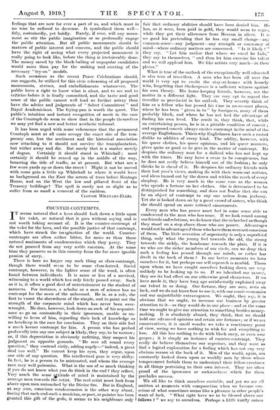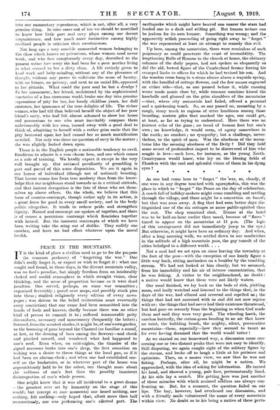COUNTER-CONTEMPTS.
IT seems natural that a hero should look down a little upon his valet, so natural that it goes without saying and is not worth taking account of. It is the counter-contempt of the valet for the hero, and the possible justice of that contempt, which have struck the imagination of the world. Countercontempts are often rather bitter, far more so than those natural sentiments of condescension which they parry. They do not proceed from any very noble emotion. At the same time they preserve us in this country from the far more ignoble passion of envy..
There is here no longer any such thing as class-contempt, though there would seam to be some class-hatred. Social contempt, however, in the lighter sense of the word, is often found between individuals. It is more or less of a survival, witnessing to a world which has only lately passed away. Such as it is, it offers a good deal of entertainment to the student of manners. For instance, a scholar or a man of science has no contempt for the mass of the unlearned. He is, as a rule, the first to vaunt the shrewdness of the simple, and to point out the strength of the corporate mind which has never been overwrought. He does, however, look down on such of his acquaintance as go on contentedly in their ignorance, unable or unwilling to learn of him, regarding their lack of knowledge as no handicap in the race for conclusion. They on their side feel a much keener contempt for him. A person who has probed profoundly into any one subject is likely, they say, to be narrow ; or, if this depreciation is obviously unfitting, they suspect his judgment on opposite grounds. "He sees all round every question," they contend airily, adding sagely—"indeed, a great deal too well." He cannot keep his eyes, they argue, upon one side of any question. His intellectual gaze is very shifty. In fact, he is a person to be mistrusted, and whom the average man may well patronize. What is the use of so much thinking if you do not know what you do think in the end ? they reflect. Very much the same Utitude of mind is maintained by the average man towards the artist. The real artist must look from above upon men untouched by the Divine fire. But in England, at any rate, conscious condescension is the other way about. Seeing that such-and-such a musician, or poet, or painter has been granted this gift of the gods, it seems to his neighbours only
fair that ordinary abilities should have been denied hint, lie has, as it were, been paid in gold, they would seem to argue, while they got their allowance from Heaven in silver. It is no good his pretending that he has any small change—any common-sense—any judgment—any strength or constancy of mind—where ordinary matters are concerned. " Is it likely ! " they cry. "Let him realize that where we excel he fails," they say to themselves, " and then let hint exercise his talent and we will applaud him. We like artists very much—in their places."
What is true of the outlook of the exceptionally well educated is also true of travellers. A man who has been all over the world is very apt to credit the stay-at-homes with homely wits, forgetting that Shakespeare is a sufficient witness against his own theory. His home-keeping friends, however, see the matter in a different light. They are very apt to regard the traveller as provincial in his outlook. They secretly think of him as a fellow who has passed his time in no-account places, where he has been "given in to" by foreigners, many of them probably black, and where he has not had the advantage of finding his own level. The result is, they think, that., while an entertaining person, he is in a pitiable condition of conceit. ; and supposed conceit always excites contempt in the mind of the average Englishman. This is why Englishmen have such a rooted dislike to oddities of every kind. The oddity, however, with his queer clothes, his queer opinions, and his queer manners, gives quite as good as he gets in the matter of contempt. Ho despises the ordinary man for a dullard who has not kept up with the times. He may have a craze to be conspicuous, but he does not really believe himself out of the fashion; he only thinks he is ahead of it.. He despises his ordinary friends with their last year's views, making do with their worn-out notions, and ideas turned out by the dozen and within the roach of every shopboy. He is very much in the same case as the woman who spends a fortune on her clothes. She is determined to be distinguished for something, and does not realize that she cart be an object of contempt to any one unless front jealousy. Yet she is looked down on by a great crowd of sisters, who think she should spend on more rational amusements.
Every man who has power must feel in some sense able to condescend to the man who has none. If we look round among our friends and relations, we do know that the richer feel as though they stood on a step above those who are poorer. Advantages would not be advantages if those who have them were not conscious of them. The little sensation of superiority is only a superficial thing, only what the young feel towards the old, the strong towards the sickly, the handsome towards the plain. If it is we who are the richer members of our circle, can we deny that such a feeling has passed through our minds, or rather has dwelt in the back of them ? In our better moments we hate ourselves for it, but perhaps our self-reproach is morbid. Those upon whom we have caught ourselves looking down are very unlikely to be looking up to us. If we inherited our money, they see its bad effect on our otherwise good characters. If we have made it, they have long ago satisfactorily explained away our talent in so doing. Our fortune, they are sure, rests on luck, and we do not know how to use it, with our comic economies and our unjustifiable extravagance. We ought, they say, it is obvious that we ought, to increase our business by greater attention to it—as they would do in our place—and at the same time we ought to give our attention to something besides money making. It is absolutely absurd, they think, that we should hold our advanced opinions and retain our fortunes; or if we ara conservatives, it is small wonder we take a reactionary point of view, seeing we have nothing to wish for and everything to lose. All this has nothing to do with black envy, or even sour grapes ; it is simply an instance of counter-contempt. They really do believe themselves our superiors, and they want to find a logical explanation for a feeling which has not any very obvious reason at the back of it. Men of the world, again, are constantly looked down upon as worldly men by those whose temperament forbids them to understand their fellow-creatures in all things pertaining to their own interest. They are often proud of the ignorance or awkwardness which for them precludes success.
We all like to think ourselves enviable, and yet we are all smitten at moments with compunction when we become con scious of what sometimes seems like a pleasure in other people's want of luck. "What right have we to be blessed above our fellows 1" we say to ourselves. Perhaps a little vanity enters into our momentary repentance, which is not, after all, a very genuine thing. In nine eases out of ten we should be mortified to know how little part real envy plays among our decent acquaintance, and how much more instinctive among highly civilized people is criticism than covetousness.
Not long ago a very sensible unmarried woman belonging to the class which knows no privations, whose women need never work, and who fare sumptuously every day, dese.ribed to the present writer how sorry she had been for a poor mother living in what seemed to her a dirty slum. A life entirely given to hard work and baby-minding, without any of the pleasures of thought, without any power fo cultivate the sense of beauty; with no leisure, no privacy, and next to no social life, appeared to her pitiable. What could the poor soul be but a drudge ? l'o her amazement, her friend, undeterred by the sophisticated aourtesies of a less strenuous world, broke one day into genuine x-pressions of pity for her, her lonely childless years, her dull existence, her ignorance of the true delights of life. The richer woman, who had till then believed herself the object of her poor friend's envy, who had felt almost ashamed to show her home and possessions to one who must inevitably compare them unfavourably with her own, turned away with a good deal to think of, admitting to herself with a rather grim smile that the pity bestowed upon her had caused her as much mortification as relief. Not only was there no question of envy in the matter ; she was slightly looked down upon.
There is in the English people a noticeable tendency to cavil. Readiness to admire is a rare charm here, and one which comes as a rule of training. We hardly expect it except in the very well brought up. Our national peculiarity of grumbling is part and parcel of this same disposition. We see it again in our horror of individual (though not of national) boasting. That horror comes less from true modesty than from the knowledge that our neighbours stand towards us in a critical attitude, and that instant derogation is the fate of those who set themselves up above others. On the whole, we believe that this force of counter-contempt, though rather ugly in its action, is a. great force for good in every small society, and in the body politic altogether. It tends to reduoe pride and strengthen dignity. Hatred and contempt are spoken of together, and there is of course a pernicious contempt which flourishea together with hatred. But the innocent oontempts of which we have been writing take the sting out of dislike. They nullify one another, and have no bad effeot whatever upon the moral health.



































 Previous page
Previous page